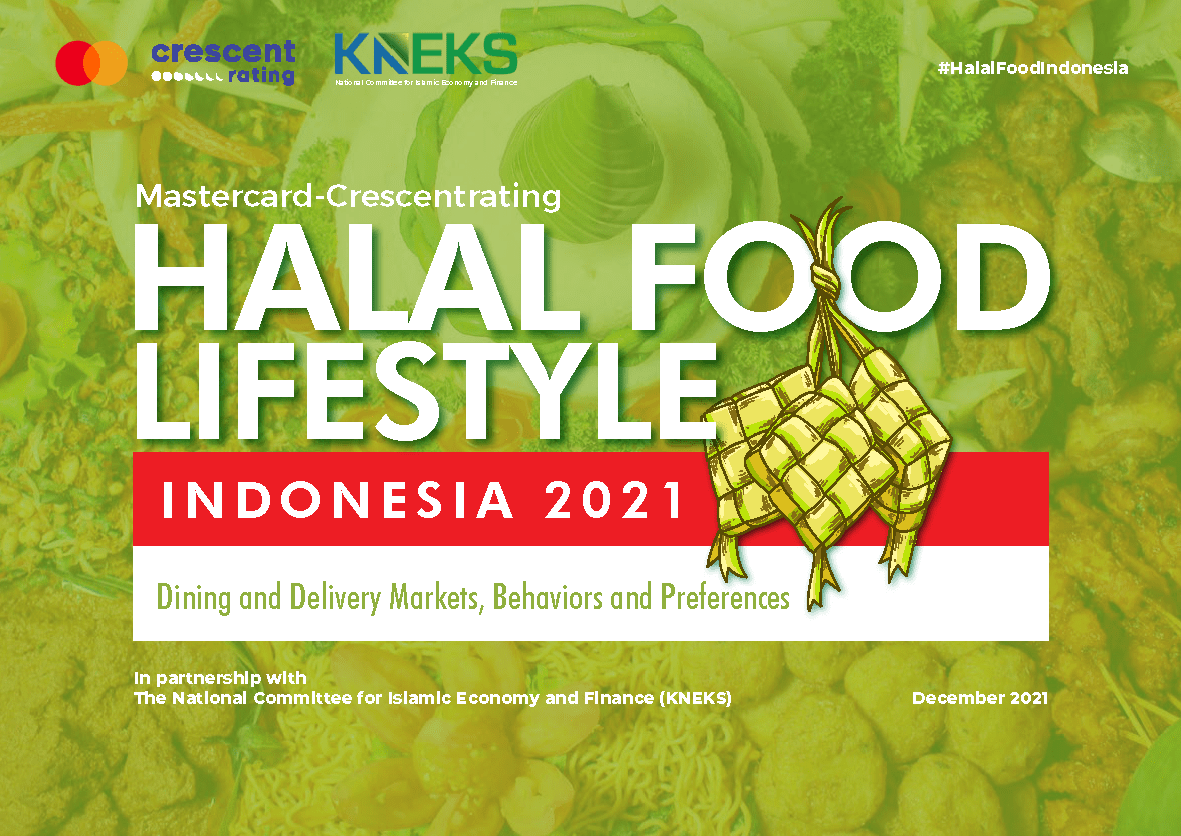
Jakarta, 15 December 2021 – Indonesian Muslims’ expenditure on dining and delivery is estimated to be IDR 1,000 Trillion, according to the Mastercard-CrescentRating Halal Food Lifestyle Indonesia Report 2021, developed in partnership with the National Committee for Islamic Economy and Finance (KNEKS). The report was released at the "Halal Dining ASEAN Forum 2021" on the 15th December 2021. As the economy re-starts, this sector will continue to provide a huge opportunity to accelerate the Indonesian domestic market’s short- to medium-term recovery.
The Indonesia report is the 2nd in the series of "Halal Food Lifestyle Reports" published by Mastercard & Crescentrating. The first report released in March this year was on the Singapore Halal dining market. As travel was restricted at the beginning of this year, these reports deep dive into the F&B industry and how it can better engage with Muslim diners when destinations ease COVID-19 restrictions.
The indepth study on the Indonesian Muslim dining habits reveal that Gen X are the biggest spenders in terms of per capita spending and total spending, accounting for 30% of the population. They are followed by millennials, who account for 28% of the local Muslim population. Gen Xs and Millennials account for close to 60% of the dining expenditure. Gen Z’s will be the next demographics to watch. As they enter the workforce in the coming years, an understanding of their behavior will open up opportunities for F&B players to keep up with their needs.
The average monthly income of over 70% of the respondents who spend less than 500,000 a month on dining is less than IDR 5,000,000. This makes up roughly 10% of their income. Indonesian local cuisines are still the most popular, especially Javanese cuisine. However, Asian regional cuisines are becoming increasingly popular. The report also highlights the contribution of the Kaki Lima (Street Food) economy as a crucial part of the Indonesian lifestyle. This sector is a lifeline for both consumers and the Kaki Lima service providers.
Indonesia has been consistently ranked as one of the top Muslim-friendly destinations in the Mastercard-Crescentrating Global Muslim Travel Index. The F&B sector will play a crucial role in rejuvenating the economy as Indonesia comes out of the COVID-19 crisis.
”The development of a halal food ecosystem should concern the dynamic changes in consumer purchasing behavior. For example, during the pandemic COVID-19, consumers tend to consume healthy, clean and hygienic food. These three criteria are part of Halal values. In other words, the Halal food market are for everyone regardless of their faith and belief. Furthermore, consumer preferences are also influenced with technology transformation and adoption. Digitalization in food and culinary industry has created on-demand application at the convenience of the consumers. Online transactions are becoming easier, from ordering, payment system, and food delivery options." said K.H. Ma'ruf Amin Vice President of Indonesia, who delivered the keynote speech at the report launch.
“We highly appreciate the collaboration between KNEKS and Mastercard-Crescent Rating to launch The Mastercard-Crescent Rating Halal Food Lifestyle Indonesia 2021 Report, which reflects the Muslim-friendly tourism industry, especially Halal food. Hopefully, this report can promote the huge potential of Halal food in Indonesia and can be a new wave of national economic growth” said Sandiaga Uno, Minister of Tourism and Creative Economy of Indonesia when delivering his speech at the launch of the report.
“While destinations are determined to open all economic activities, there is still the threat of new COVID-19 variants emerging. Nevertheless, we stay hopeful that life will begin to return to some form of normality in 2022. The richness and diversity of Indonesian cuisine is a great asset of Indonesia. Although the local consumers have been the primary driving force in propelling the growth of the Indonesian Halal dining sector, this new beginning will also be the time to reimagine how Indonesia could become a Halal cuisine haven in the region.” said Fazal Bahardeen, CEO of CrescentRating & HalalTrip.
Navin Jain, Country Manager, Indonesia, Mastercard said, “As the world’s largest halal economy, domestic spending in Indonesia on halal products and services stood at $184 billion in 2020, and is projected to increase to $281.6 billion by 2025. Mastercard is committed to supporting the country’s halal ecosystem by offering the benefits of its products, technology and insights in driving halal lifestyles as a key differentiator when it comes to global halal tourism.”
“The launch of this report is expected to be the catalyst for the development of Halal foods and beverages industry as well as strengthen the collaboration among the stakeholders in the effort to boost the Halal industry in Indonesia.” said Ventje Rahardjo from KNEKS.
The Muslim travel market was one of the fastest growing tourism sectors in the world, pre-COVID-19, reaching 160 million visitors in 2019. The Mastercard-CrescentRating Global Muslim Travel Index (GMTI) 2021 released in July this year, projects that this market will recover upto 80% of 2019 levels sometime in 2023. As destinations open up for international travel, this market will continue to play a significant role to accelerate the economic recovery of destinations.
The full report is available at: https://www.crescentrating.com/halal-muslim-travel-market-reports.html.